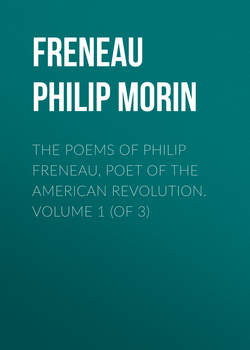Читать книгу The Poems of Philip Freneau, Poet of the American Revolution. Volume 1 (of 3) - Freneau Philip Morin - Страница 2
LIFE OF PHILIP FRENEAU
1752-1832
LIFE OF PHILIP FRENEAU
I
ОглавлениеIn the possession of the Freneau descendants there is an old French Bible, printed in Geneva, Switzerland, in 1587, which preserves an unbroken roll of the heads of the family back to the original owner of the book, Philip Fresneau, who on his death-bed in La Chapelle, France, in 1590, gave it into the hands of his eldest son. For five generations the book remained in the little suburban village, its possessors sturdy, industrious tradesmen, who stood high in the esteem of their community and yet who on account of their Protestant faith were often imposed upon and at times even persecuted. It was doubtless this feeling of insecurity, if not positive persecution, which compelled André Fresneau, like so many of his fellow Huguenots, to leave his native village and to seek a home in a more tolerant land.
He landed in New York in 1707. He was in his thirty-sixth year, an active, handsome man, almost brilliant in certain directions, of pleasing address, and skilled from his youth in the handling of affairs. He became at once a leader in the little Huguenot Colony whose center was the quaint old church "du St. Esprit" on Pine street. He was soon in the midst of a thriving shipping business, dealing largely in imported wines, and in 1710, three years after his arrival, he was able to furnish a beautiful home on Pearl street, near Hanover Square, for his young bride, Mary Morin, a daughter of Pierre Morin, of the French Congregation. Of the comfort and hospitality of this home there are many contemporary references. John Fontaine, the French traveller, was entertained here in 1716 and he speaks highly of his host and his entertainment.1
In 1721 Mrs. Fresneau died at the early age of twenty-seven, leaving behind a family of five children, the oldest only nine years of age. Four years later the father followed. But the young family was far from destitute. The business house in New York had grown to be very profitable and there was a large landed estate in eastern New Jersey, a part of which was sold in 1740. Soon the two eldest sons, Andrew, born 1712, and Pierre, born January 22, 1718, were able to continue their father's business. For years their firm name was familiar in New York.
Pierre Freneau (the family seem to have dropped the "s" about 1725) was married in 1748 to Agnes Watson, daughter of Richard Watson, of Freehold, whose property bordered upon the Freneau estate. They made their home in Frankfort street, New York, and here on January 2 (O. S.), 1752, was born their eldest child, Philip Morin Freneau, the subject of our sketch. Four other children came from their union, of whom only one, Peter, born April 5, 1757, who in later years became a prominent figure in Charleston, S. C., need be mentioned.
The home of the Freneau's was one of comfort and even refinement. There was a large and well selected library, the pride of its owner. "There," he would say to his visitors, pointing to his books, "use them freely, for among them you will find your truest friends." He delighted in men of refinement, and his home became a social center for the lovers of books and of culture. He looked carefully after the education of his children; and all of them early became omnivorous readers. In such an environment the young poet passed his first ten years.
In 1762 the family decided to leave New York and to make their home permanently on their estate, "Mount Pleasant," near Middletown Point, N. J. The estate at this time contained nearly a thousand acres, and with its large buildings, its slaves and its broad area under cultivation, was in many respects like a southern plantation. Heretofore the elder Freneau had made it of secondary importance. He had used it as a summer resort, and as a pleasant relief to the monotony of his city business, but now, perhaps on account of failing health, he determined to devote to it all of his energies. Philip was left behind in New York. For the next three years he lived at a boarding school in the city, going home only during the long vacations. At the age of thirteen he was sent to the Latin school at Penolopen, then presided over by the Rev. Alexander Mitchell, to prepare for college.
The father of the family died Oct. 17, 1767. This, however, did not disturb the plans of the eldest son, and on Nov. 7, 1768, he entered the sophomore class at Princeton so well prepared that President Witherspoon is said to have sent a letter of congratulation to his mother.
1
Ann Maury's Memoirs of a Huguenot.
